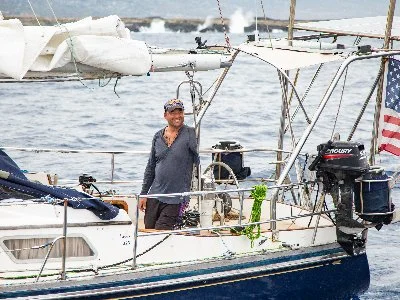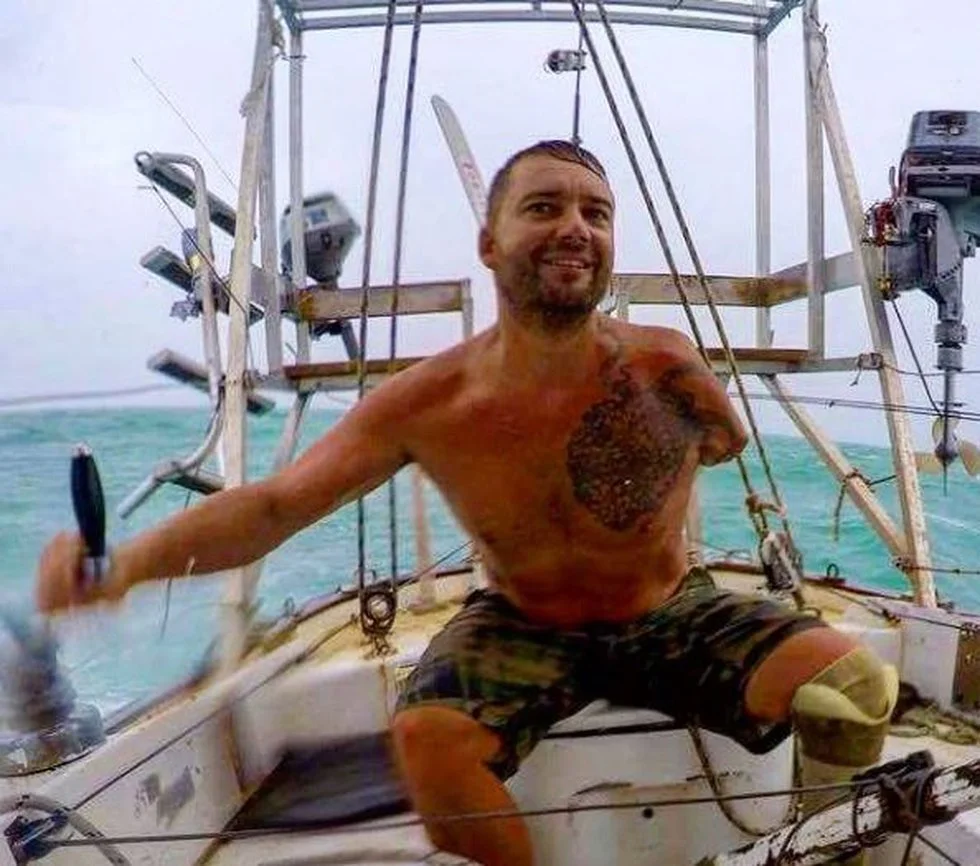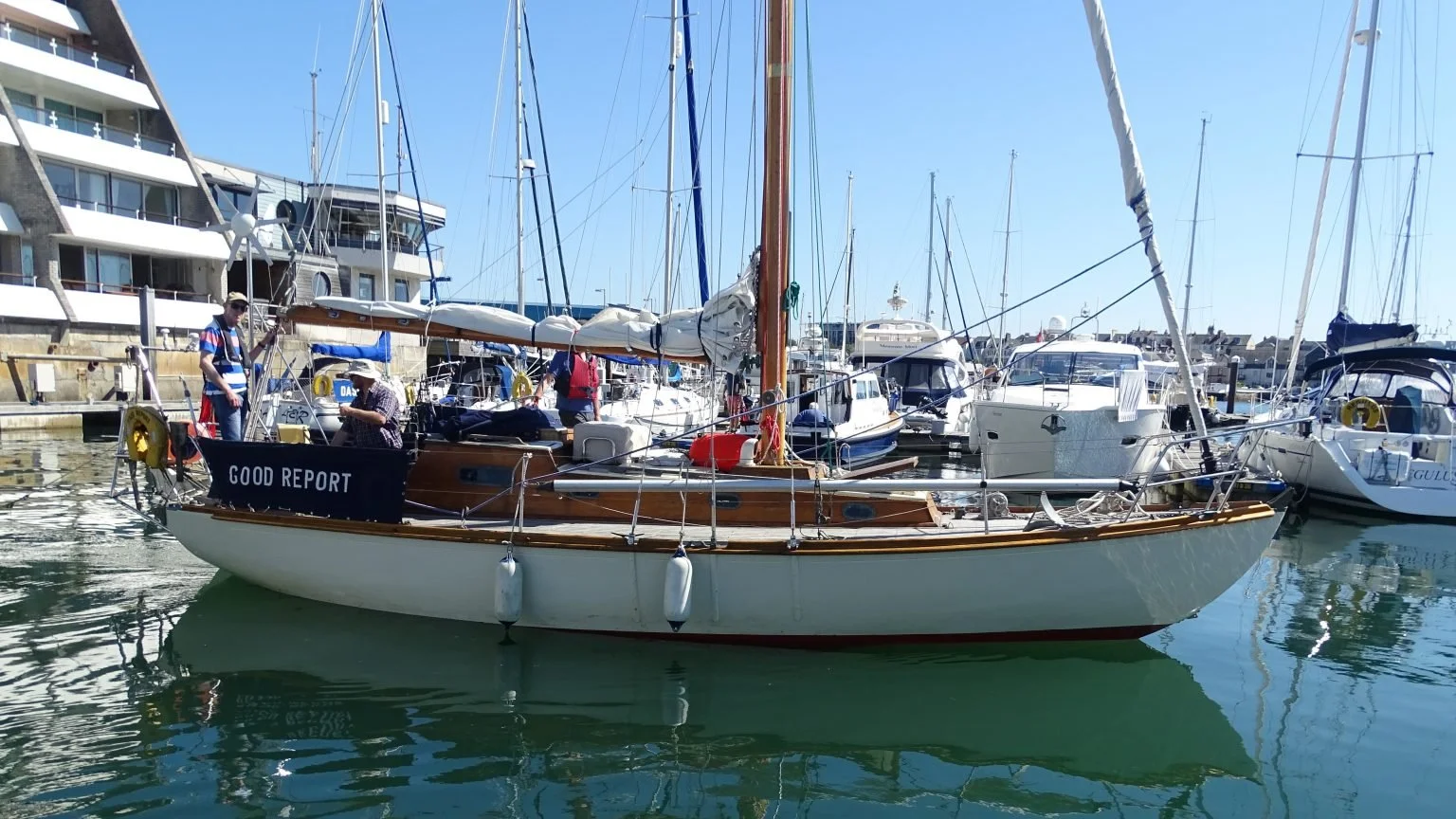The Ocean Cruising Club Announces Awards for 2021
The OCC is the “home port” for those who have sailed long distances across big oceans. With 45 nationalities represented among more than 3100 members and Port Officers around the world, they have a more diverse membership and a more international reach than any other blue water sailing organisation.
The Ocean Cruising Club exists to encourage long-distance sailing in small boats. A Full Member of the OCC must have completed a qualifying voyage of a non-stop port-to-port ocean passage, where the distance between the two ports is not less than 1,000 nautical miles, in a vessel of not more than 70ft (21.36m) LOA;
Associate members are committed to achieving that goal. This standard distinguishes the OCC from all other sailing clubs. The membership as a whole has more experience offshore than any other sailing organisation – in the number of circumnavigators, in the range of extraordinary voyages members have completed, and in the number of solo sailors and female sailors among our ranks. This is what sets them apart from other organisations.
Devon, UK, 24 January 2022
Despite another year of pandemic challenges, the OCC Awards Subcommittee has found numerous achievements to recognise in the cruising world. Nominations are made by Full Members of the OCC, winners are selected by a highly experienced team of bluewater cruisers, and selections are approved by the OCC General Committee.
The OCC is especially pleased to announce that Dustin Reynolds is this year’s recipient of the Club’s premier award, The OCC Barton Cup, which salutes an exceptional or challenging voyage or series of voyages. A double amputee following a motorcycle accident in 2008, six years later Dustin left Hawaii aboard his 35ft Alberg sloop, Tiama.
TIAMA
By 2018 he had reached South Africa and has now completed his circumnavigation via the Panama Canal, not to mention a side-trip to Antarctica aboard a friend’s 38 footer. The journey took Dustin 7.5 years, starting and ending in Kona HI. With little experience and little to no money he found a way to pursue his dream. It should be pointed out that Dustin’s boat is extremely low-tech, with no electric winches or other gismos to make his sailing easier. In fact, prior to the Royal Cape Yacht Club presenting him with a self-tailing winch in early 2019, he lacked even this basic piece of kit. Dustin was a recipient of the OCC Challenge Grant and in 2018 was recognised with the OCC Seamanship Award.
Dustin Reynolds
Dustin has given many motivational talks en route, demonstrating by his own example that almost any obstacle can be overcome with determination and perseverance. Following his accident and slow recovery his aim was to seek a different way of life, and the life he chose is inspirational.
The OCC Seamanship Award goes to George Arnison s/v Good Report and Duncan Lougee s/v Minke in recognition of their outstanding seamanship during their first ocean passage in the 2021 Jester Azores Challenge. Duncan Lougee in Minke, a 25’ Folkboat, and George Arnison in Good Report, a 30’ wooden sloop, were sailing from Plymouth to the Azores as part of the 2021 Jester Challenge when damage to Minke resulted in a remarkable display of self-reliance and seamanship by the two single-handed sailors. Some 400 miles from Terceria, George received a satellite message from the Jester 'Helm' (Roger Taylor) asking if he could go to the assistance of another challenger whose rudder had become detached from his boat. George, 40 miles to leeward, immediately came about and in strong winds started the long beat to windward in search of the crippled boat. In deteriorating conditions Good Report encountered problems of her own - her genoa furling line parted and George had to hand the genoa and replace it with the storm jib. George continued his beat to windward, sometimes heaving-to in gale force conditions. It took him a couple of days to reach the other boat. On arrival George could see that his fellow challenger had rigged an emergency rudder and so for a while both boats continued onwards towards Terceria. Ironically, with no genoa, Good Report was now struggling to keep up and so George jury rigged his genoa in order to stay in touch. After a few hours the Folkboat's emergency rudder failed. George stood by whilst his fellow Jester sought an alternative solution. Eventually he managed to sail the boat in roughly the right direction by balancing the sail plan. However, the Folkboat struggled to maintain a reasonable course and so the two men set up a towing system. Over the next week or so the two Challengers adapted their tactics in response to the weather; sometimes they sailed separately, sometimes Good Report would tow the Folkboat and at other times, rough weather, including a Force 9 gale, forced them to repeatedly heave-to. Some 11 days after receiving the request for help, Good Report and Minke crossed the finish line at Pria da Vitoria, Terceria.
George Arnison, the skipper of the 30ft wooden sloop, Good Report has received the Ocean Cruising Club Seamanship Award. Credit: John Willis
The OCC Award has two components – one rewards members who contribute valuable services to the OCC and the other for anyone who contributes extraordinary service to the cruising community at large. This year, we recognise a team which contributed extraordinary service to all in need. The 2021 OCC Award recognises Team South Pacific 2020: Juan Boschetti, Liz Back, Cynthia Rasch, John and Lyn Martin, John Hembrow, Viki Moore, and Sue Richards. The team was instrumental in supporting yachts caught in COVID limbo across the Pacific in 2020. Each worked on specific aspects and all coordinated their efforts with the Ocean Cruising Club (Guy Chester and Fiona Jones). Without the various solutions achieved, cruisers would have faced serious issues, as it was solutions whilst not the most desirable outcomes that ensured yachts in Covid limbo had opportunities for safe haven for the southern cyclone season and could move to suitable ports. Each of these individuals run businesses (marinas, rallies etc.) and have commitments, yet all put aside their commercial interests and worked tirelessly for outcomes to support the cruising community generally, whether clients or not. They used their contacts and influence to gain safe outcomes for cruisers during the Covid hiatus. Importantly many worked for outcomes that benefitted competitor businesses (e.g. other marinas, marine services and agents) for the significant benefit of all cruisers. Each of these stakeholders worked collaboratively with the Ocean Cruising Club and openly shared contacts and confidences as situations evolved. For further information about their individual contributions, please see the OCC website.
The OCC Lifetime Cruising Award 2021 is presented posthumously to James Wharram (deceased 14th Dec. 2021 aged 93). James Wharram, considered by many as the father of modern multihull cruising, was a free-spirited sailor and designer who specialised in doublecanoe style sailing catamarans, inspired by the Polynesian double canoe. Although James came from a non-sailing background – he was born in Manchester in 1928 – he became fascinated by Polynesian double canoes after reading Éric de Bisschop’s "The Voyage of the Kaimiloa" as a teenager. Starting small in the early 1950s, one of his first designs was the 23ft 5in Tangaroa in which he and two young women sailed from the Canaries to Trinidad in 1955. Wharram wrote about crossing the Bay of Biscay in Tangaroa in 1956, going into details about the catamaran’s performance, easy motion and stability. This was in direct contrast to the then widely-held opinion that the motion of a catamaran would be worse than that of a single-hulled yacht with a keel. On a beach in Trinidad, with the help of French sailor Bernard Moitessier, they built the 40ft Rongo, in which they sailed north up the US East Coast before crossing from New York back to the UK, the first ever North Atlantic West-to-East crossing by a multihull. James started designing for self-builders in 1965. Along with his partners Ruth Merseburger and Hanneke Boon, he created distinctive V-hull double-ended catamarans, from 13ft to over 60ft, selling more than 10,000 sets of plans. Nearly all of James’s long passages were made aboard vessels that he designed and built himself with the help of his largely female workforce. He remained very aware that most Wharram catamarans were built by amateurs, for whom they offered the possibility of very economical cruising. Despite waning in popularity over recent years, Wharram catamarans maintain a loyal following and have made some notable voyages, including that of Rory McDougall who received the 2015 OCC Jester Medal for circumnavigating aboard Cooking Fat, a 21ft Wharram-designed Tiki. In addition to seven Atlantic crossings – see "Two Girls Two Catamarans" (1968) and "People of the Sea" (2020) – during the 1990s, James, his long-time companions Ruth Wharram and Hanneke Boon and their son Jamie, plus other crew for various legs, made a five-year circumnavigation aboard his 63ft Spirit of Gaia. Although this was his last long voyage, James remained active as a designer until shortly before his death. Finally, he was a fine writer, producing several books and many magazine articles over the years. His autobiography, "People of the Sea", written with Hanneke Boon, was reviewed in Flying Fish 2021/1 and is highly recommended.
New for 2021 is the OCC Environment Award, which in its inaugural year recognizes Americans Richard & Stephanie Hackett who started and run an NGO based in the Pacific region called Sea Mercy.
Sea Mercy, whose motto is ‘Sailing with a higher purpose’, organizes private yachts to deliver humanitarian aid and disaster relief to the island nations of the South Pacific. Several OCC Members are very involved (Jonathan Robinson s/v Chez Nous is a Coordinator for Fiji) and the OCC has supported numerous efforts of theirs with PR. They have helped rebuild after destructive cyclones and have instituted many programs whereby the islanders can support themselves over the long term after a natural disaster. One program stands out as particularly ecologically sound. They observed that when providing emergency shelter and clean drinking water following a natural disaster, aid agencies often leave behind a long-term man-made ecological disaster of plastic trash. So Sea Mercy created an ecologically safe and cost-effective solution for disaster response providers to provide clean fresh water. Sea Mercy All-purpose Rainwater Tarp (SMART), designed & produced for them by DRIFTA Camping & 4wd, takes about 30 minutes to set up and costs about $1200 USD. Each SMART kit can store over 500 litres of clean water for drinking (41 days’ supply of water for a family of 4). The tarp area provides over 10 square metres of water catchment capacity and as little as little as 13 mms of rain (1/2 inch) can collect and store over 110 litres of drinking water.
The Vasey Vase recognises "an unusual or exploratory voyage made by an OCC member or members" and, for 2021 is awarded to Ginger and Peter Nieman. Peter and Ginger recently finished their second circumnavigation, this one eastabout. (Their first was westabout via all southern capes). It included the NW passage, then down to the US SE coast to Florida, across the Atlantic, around the UK and the Mediterranean, and through the Suez. Then they ventured across the northern Indian Ocean, where they were finally allowed to stop in Singapore, although they could not go ashore for months due to Covid restrictions! Finally, they headed north to cruise Japan, across to Alaska, and back down to the Pacific NW coast. An extraordinary 5-year circumnavigation, showing great seamanship and perseverance, especially during the last year under the lockdowns imposed by Covid.
Commodore Simon Currin congratulated all the winners upon notifying them of their awards,
“Once again, we had the opportunity to recognise not only the most adventurous among us, but also those who took it upon themselves to help others in great need during adversity, whether on land or at sea. Thankfully, it appears that cruising as a lifestyle will become more stable in the coming years as the pandemic takes on an endemic stance in our lives.” Awards Sub-Committee Chair Eoin Robson concluded, “My sincere thanks to the independent judges who took their task very seriously! We had several categories with multiple deserving nominations and even had to institute tie-breakers for the first time. They did a stellar job. I am grateful for their time and effort as well as for all the nominations by our members.”





